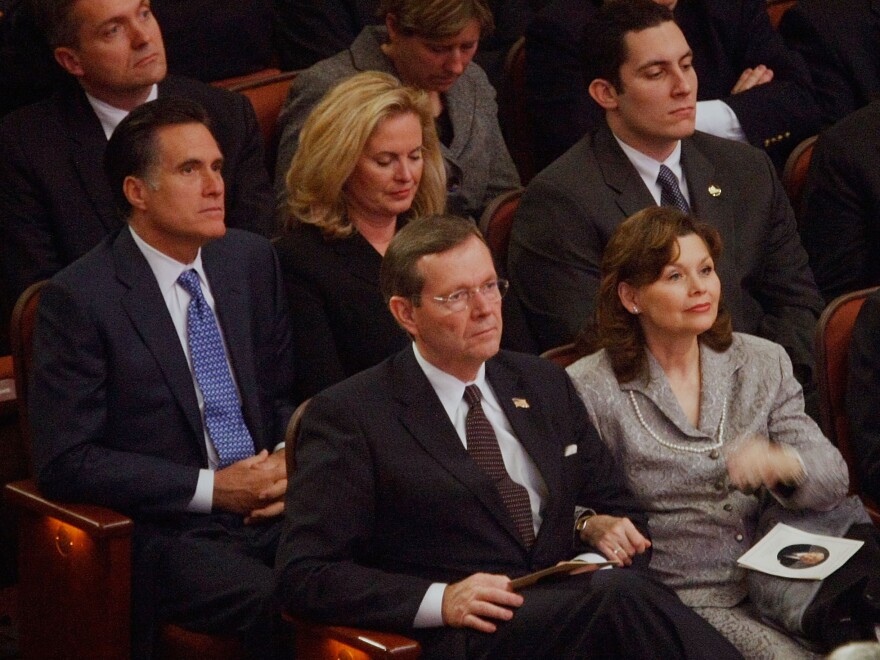With many conservatives already suspecting that he is a conservative of convenience, Mitt Romney apparently hasn't done himself any favors in their eyes with the man he chose to lead his presidential transition.
Politico broke the story Sunday that Romney has chosen Michael Leavitt to oversee the creation of an executive branch in waiting.
Leavitt certainly seems to have the requisite managerial experience: He's been Utah's governor, administrator of the Environmental Protection Agency and Health and Human Services secretary under George W. Bush.
But some of Leavitt's experience has been of the wrong kind, according to some conservatives. Since leaving public service, Leavitt has worked as a consultant who as advocated for the health care insurance exchanges central to the Affordable Care Act, known by detractors and supporters alike as ObamaCare.
The Leavitt pick is interesting in part because it's a reminder of Romney's own campaign struggles about the health care reform law, with its individual mandate, that he signed as governor of Massachusetts.
Obama administration officials and others have cited the legislation Romney signed into law in Massachusetts as a model for the federal law, and that's put Romney on the defensive.
As a presidential candidate, Romney has tried to distance himself from the federal law by arguing that it's a completely different beast than the Massachusetts legislation.
Leavitt, however, has embraced major aspects of the law. That, in turn, has led some on the ideological right to express no small disdain for Romney's choice.
Over on the Libertarian Cato Institute's Cato@Liberty blog, Michael Cannon wrote:
"Leavitt has spent the last couple of years spreading dangerous (but self-enriching!) nonsense about how states would benefit by establishing ObamaCare's health insurance "exchanges." He seldom mentions that his "consulting" business Leavitt Partners rakes in tons of ObamaCare cash by bidding on those contracts. Perhaps this is because reporters seldom ask..."
"... Romney's appointment of Leavitt is a first step toward flip-flopping–or Etch-a-Sketching, or Romneying(TM), or whatever–on ObamaCare repeal. But it's hard to blame Romney for thinking Republicans won't care. These are, after all, people who picked Mitt Romney as their presidential nominee."
Ben Domenesch, a co-founder of the conservative web site RedState and a senior fellow at the Heartland Institute, projects ahead. If Romney defeats President Obama, Domenesch laments on the Ricochet blog, Leavitt would be well situated to become Romney's chief of staff.
"What's most concerning about all of this is not that Romney selected one of the few Republicans in the country who backs implementation of Obamacare's exchanges. It's what the selection of Leavitt means as an indication of how Romney would potentially "fix" Obamacare if repeal proves impossible...
"Should the Supreme Court strike down only a portion of Obamacare, it seems clear Leavitt would be a major voice in deciding how to replace it. And he is convinced that "exchanges are part of the future, no matter what."
Even before he began lobbying for states to create insurance exchanges, Leavitt was perceived by some conservatives and libertarians as not sufficiently reliable on their issues.
Phillip Klein at the Washington Examiner points to a striking fact: In 2002, Leavitt received a grade of "D" on fiscal management from Cato, the same as the liberal Democrat, former Vermont Gov. Howard Dean.
For its part, the Romney campaign has tried to calm conservatives, telling them the choice of Levitt doesn't signal any wobbliness in its candidate's pledge to repeal Obama's health care law.
Matt Lewis at the Daily Caller writes:
"Reached for comment, Romney spokesman Lenny Alcivar said: 'Unlike President Obama, voters can rest assured that a Romney Administration will put America back on track. That starts with repealing Obamacare, starting Day One. Make no mistake, the only person who will make policy decisions under a Romney administration is Mitt Romney.' "
Copyright 2020 NPR. To see more, visit https://www.npr.org.



